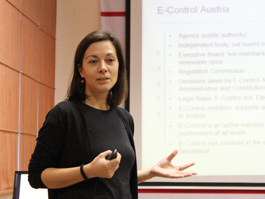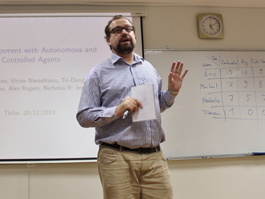On November 28, ISET hosted a seminar delivered by two experts working for E-control Austria - Eszter Suele (Resident Twinning Advisor) and Leo Kammerdiener (Senior Tariff and Regulatory Expert). E-control Austria is collaborating with the Georgian National Energy and Water Supply Regulatory Commission (GNERC) under a “Twinning Project” to improve the Georgian electricity regulation that promotes long-term investments and helps establish methods of tariff calculation in line with European Union standards and best practices, namely incentive-based tariff regulations.
Task Assignment with Autonomous and Controlled Agents was the topic of an interactive seminar given by Dr. Florian Biermann at ISET on November 20, 2013. The assignment problem is one of the most famous branches of operational research. The general problem concerns a situation whereby one has a number of tasks that should be divided among employees. The purpose of the seminar was to show an algorithm for optimal task allocation among autonomous and controlled agents.
Dr. Biermann immediately attracted the attention of the audience by introducing an interesting and very suitable example concerning ISET. The example was as follows: four tasks need to be divided among four agents (four ISET faculty members), the efficiency of the different tasks done by different faculty members is different. The aim was to find the way that the tasks should be divided in order to maximize the outcome for the institution.
Land Ownership of Agricultural Land: Political Stability and Social Cohesion vs. Economic Efficiency
On November 8, 2013, ISET hosted the first event in a series of discussions on the topic of inclusive growth. The topic of the event was Land ownership of agricultural land: political stability and social cohesion vs. economic efficiency. The presentation opened with a short video prepared especially for the dialogue and was followed by a short presentation about the sector.
Moderated by Giorgi Bakradze, senior research advisor at the ISET Policy Institute, the central question addressed by the various stakeholders was how Georgia could ensure investors’ property rights, promote land consolidation and develop modern agribusinesses while, at the same time, benefiting the poor, maintaining social cohesion and avoiding political destabilization. Other issues for discussion were what to do with the past and in the future; how to reconcile investors and attract even more capital in agriculture.













